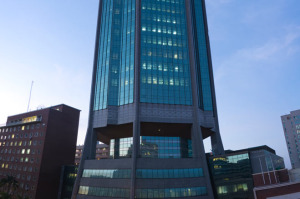
THE Securities Exchange Commission of Zimbabwe (Secz) has engaged the Reserve Bank of Zimbabwe, urging it to allow foreign investors on the Zimbabwe Stock Exchange (ZSE) to repatriate some of their dividends.
BY VICTORIA MTOMBA
Secz chief executive officer Tafadzwa Chinamo said foreign investors needed to take out their money outside the country without hassles — a move he said would lure other investors.
“We had a meeting with the governor of the Reserve Bank [John Mangudya] and we said this is something that needs to be done to give priority to investors,” he said.
“They acknowledged it. If you want to be a good investment destination, you need to make it easy for investors to take their money out.”
Some ZSE investors have been failing to take their money out after companies declared dividends due to the cash crisis that is prevailing in the country.
A local analyst said the delays in the repatriation of funds to foreign investors would dampen the investors’ appetite to sell as there would be no certainty as to when they could get their money back.
“One cannot risk losing their shares after selling; remember the time value of money,” the analyst said.
- Chamisa under fire over US$120K donation
- Mavhunga puts DeMbare into Chibuku quarterfinals
- Pension funds bet on Cabora Bassa oilfields
- Councils defy govt fire tender directive
Keep Reading
“You cannot have your money sitting in a bank for a month or so when it should be earning something for you.
“Buyers are also scarce because of the same reasons. You don’t invest in a market where chances of repatriating the dividend capital gains and the initial investments are not guaranteed.
“Foreign brokers, who are the main middlemen between local brokers and foreign brokers, are also being affected as their commissions, through rebates, are not being repatriated on time,” the analyst said.
Foreign investors are the main drivers of trade on the ZSE.
In the first half of the year, investors dominated the ZSE, accounting for 63% of the trade up from 51% achieved in the same period in 2015.
Foreign sales to turnover ratio increased to 38% in the period under review from 25% in the comparable period in 2015.
A market analyst said monetary authorities needed to understand that when there was a foreign seller and a foreign buyer, the amounts should just net off so that they are subjected to a waiting list.
A local research firm said in its report for the first half of the year that there were uncertainties during the period, with average monthly turnover dropping to $15 million from $23 million realised in the same period in 2015.
The research firm said foreign portfolio flows into the country had been unstable as mirrored by the trend of the foreign purchases to total value.
The country has been struggling to attract foreign direct investments due to unfavourable investment climate as well as policy inconsistencies.
The uncertainties hit companies hard at the beginning of the year when Indigenisation minister Patrick Zhuwao threatened to close companies that failed to comply with the empowerment rules by April 1.
The legislation stated that at least 51% shareholding in all companies operating in Zimbabwe and with a net asset value of $500 000 and above should be in the hands of locals. President Robert Mugabe later intervened with a clarification when investors had already bolted.
For the first time in seven years, the bourse recorded a shocking daily turnover of a paltry $105 on July 26 — a day when just one counter traded — from a one-day trading peak of $1 million.
The annual turnover of the local bourse since 2009 when the country introduced the multi-currency system up to around 2014, has been close to half a billion dollars but it declined drastically to $228 million in 2015.
In 2009, turnover stood at $413,9 million, declining to $391,5 million in 2010. It rose to $477,5 million in 2011, $448 million in 2012, $485,7 million in 2013 and $452,8 million in 2014.
The country has been in deflation since 2014 and this has resulted in a decline in aggregate demand, with most companies failing to push sales and reduce prices of commodities in order to stimulate demand.
The stock market is a mirror image of any economy and its performance is used by investors as a measure of a nation’s health.











